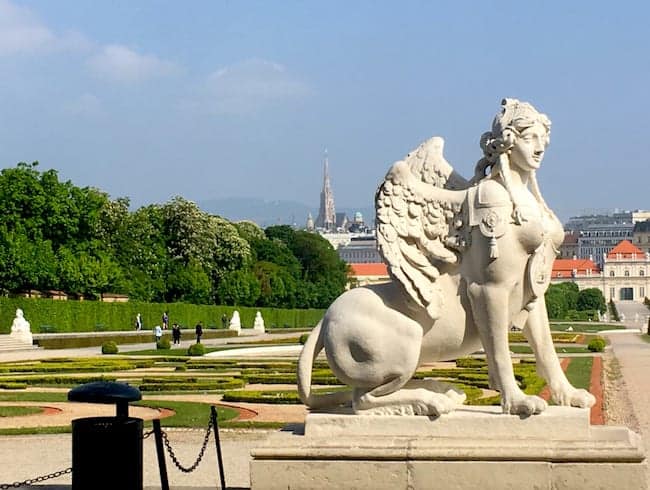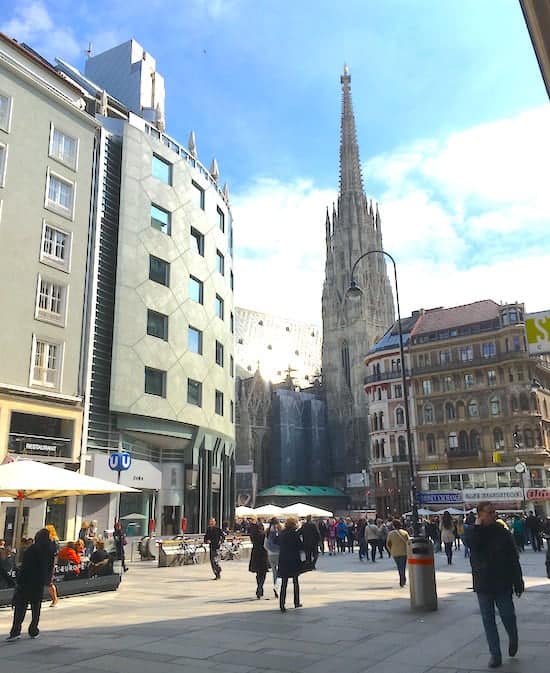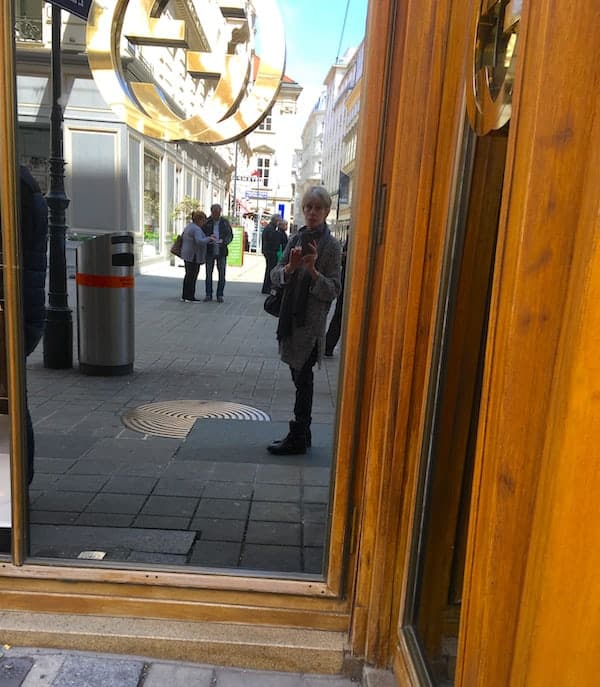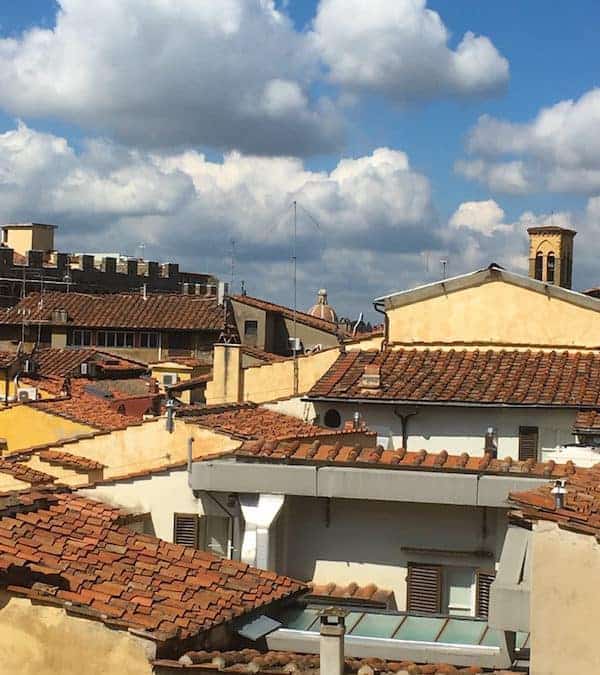There are many forms of being in conflict with oneself, but few are as universal, if irrational, as that feeling you have after a satisfying trip far away from your everyday life. For two weeks I was lucky enough to be in Vienna and, briefly, Florence. By the end of the richly rewarding journey of sensory pleasures—opera, concerts, art exhibitions, regional cuisine, architecture—it was time to come home. Yet a mere 24 hours after being back, and after soaking up the enjoyment of my sweetheart, my own bed, the foods I love….I longed to be back in a great European city that could not possibly be more different than the small seaside town in California where I live.
What is that about?
 Nothing feels better than coming home after a stretch of time in which each day has required strategizing over where you will eat, whether your grasp of German and Italian (or whatever non-native language) will suffice without causing howls of derision, walking until your feet scream, struggling with jet lag, and dining with strangers or alone with only your cell phone (or a book!) for company. Being at home means never having to say “come se dice “clueless” in Italiano.” Being at home means not having to endure the specific humiliation of being handed a menu in English when you’ve worked your butt off to master restaurant German. Being at home means not having to negotiate hieroglyphic subway signage, taxi prices, the ridiculously small size of street names on maps that you’re trying not to be seen using.
Nothing feels better than coming home after a stretch of time in which each day has required strategizing over where you will eat, whether your grasp of German and Italian (or whatever non-native language) will suffice without causing howls of derision, walking until your feet scream, struggling with jet lag, and dining with strangers or alone with only your cell phone (or a book!) for company. Being at home means never having to say “come se dice “clueless” in Italiano.” Being at home means not having to endure the specific humiliation of being handed a menu in English when you’ve worked your butt off to master restaurant German. Being at home means not having to negotiate hieroglyphic subway signage, taxi prices, the ridiculously small size of street names on maps that you’re trying not to be seen using.
 But as Sartre liked to remind us, nothing makes us feel as alive as struggle. Nor does the successful result leave as lasting an impact as when we had to work for it. Adversity is bracing. And that sense of quest, of having to work for the cold beer at the top of the hill, or that first glimpse of the Duomo after a 12-hour plane trip—these are what sweeten both the present moment, and that lasting memory of travel.
But as Sartre liked to remind us, nothing makes us feel as alive as struggle. Nor does the successful result leave as lasting an impact as when we had to work for it. Adversity is bracing. And that sense of quest, of having to work for the cold beer at the top of the hill, or that first glimpse of the Duomo after a 12-hour plane trip—these are what sweeten both the present moment, and that lasting memory of travel.
 And then there’s the slammed against the wall discomfort and disarray of long-distance travel. The customs lines, the dishevelment of TSA, the spatial cram and compromise of airplane seating, the out-of-body haze of having been semi-conscious for 20 hours and then having to check into a hotel with something close to dignity. [A sidebar you’ll enjoy: as my Slovakian cabbie approached the inner city of Vienna, he was stopped at the bridge over the Donau canal. According to the polizei, all roads to the old city were closed. It was a Friday, the end of April. No explanations. My poor driver was apologetic but he had to let me out right there, with only a few indications of where I should go—straight ahead, turn right, then another left to my hotel. This is after SFO to Frankfurt, Frankfurt to Vienna, 15 hours of travel and loaded down with one huge rolling suitcase and another carry-on case. I had to actually roll both cases through the streets of Vienna, ask for directions twice, then go the long way through throngs of student tour groups and people with selfie sticks all clustered around the huge cathedral, just attempting to stay on my feet. Arms aching, utterly wiped out, I made it to my hotel. Not my best travel memory.]
And then there’s the slammed against the wall discomfort and disarray of long-distance travel. The customs lines, the dishevelment of TSA, the spatial cram and compromise of airplane seating, the out-of-body haze of having been semi-conscious for 20 hours and then having to check into a hotel with something close to dignity. [A sidebar you’ll enjoy: as my Slovakian cabbie approached the inner city of Vienna, he was stopped at the bridge over the Donau canal. According to the polizei, all roads to the old city were closed. It was a Friday, the end of April. No explanations. My poor driver was apologetic but he had to let me out right there, with only a few indications of where I should go—straight ahead, turn right, then another left to my hotel. This is after SFO to Frankfurt, Frankfurt to Vienna, 15 hours of travel and loaded down with one huge rolling suitcase and another carry-on case. I had to actually roll both cases through the streets of Vienna, ask for directions twice, then go the long way through throngs of student tour groups and people with selfie sticks all clustered around the huge cathedral, just attempting to stay on my feet. Arms aching, utterly wiped out, I made it to my hotel. Not my best travel memory.]
 There’s more to ponder here. Once jetlag and the utter exhaustion of the long flight wore off, I began to walk the streets, learn where my favorite new cafes were, meet up with fellow opera-lovers for the many evenings of great music, revisit museums I hadn’t seen since grad school. In other words, I began residency in a new world. I had carved out yet another life, a new identity in which I was psychologically at least in two places at once.
There’s more to ponder here. Once jetlag and the utter exhaustion of the long flight wore off, I began to walk the streets, learn where my favorite new cafes were, meet up with fellow opera-lovers for the many evenings of great music, revisit museums I hadn’t seen since grad school. In other words, I began residency in a new world. I had carved out yet another life, a new identity in which I was psychologically at least in two places at once.
And that may be the key to this double bind, this longing to be home while wishing to be traveling again. Going far enough away from familiar scenes that you are forced to see differently, move differently, speak differently, creates a new existence. I had extended my life by two weeks, carving out more time and more space while still being my “real” self in my “real” identity.
 Travel gives us not only new spaces, it gives us more time. And the illusion of an expanded life. I can live in two places at once. At least for a while—as long as my feet (and my money) hold out.
Travel gives us not only new spaces, it gives us more time. And the illusion of an expanded life. I can live in two places at once. At least for a while—as long as my feet (and my money) hold out.



Florence is my favorite city. Well, maybe Paris is better. So lovely reading about your trip, Christina. Travel really does make our brains more creative…so I look forward to hearing more.
The other thing I love about travel is how it makes you see ordinary things with new eyes; it’s a bit like a rebirth. Everything seems so new and fresh and super-saturated with color and exciting!
Thank you for expressing your thoughts about travel so well. I find myself in total agreement with your conclusions and would add that I often have a sense of being completely alive when traveling, perhaps because one has to really be focused on solving the numerous small and sometimes bigger issues as well as constantly be exposed to so much previously unknown information and experience. You have to really think.
I have a frequent dream after returning home. In my dream I discover a previously unknown entrance to an underground train station and a short easy ride lands me right back in Paris London Rome or some other compelling destination and there’s a sense of wonder, why haven’t I done this before, how could this secret station have stayed a secret so long? If only!